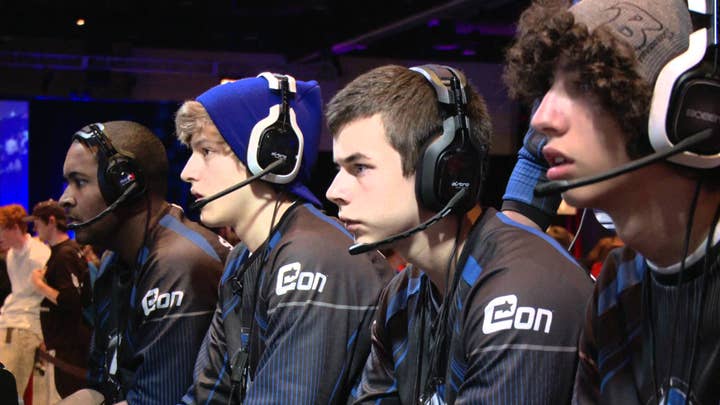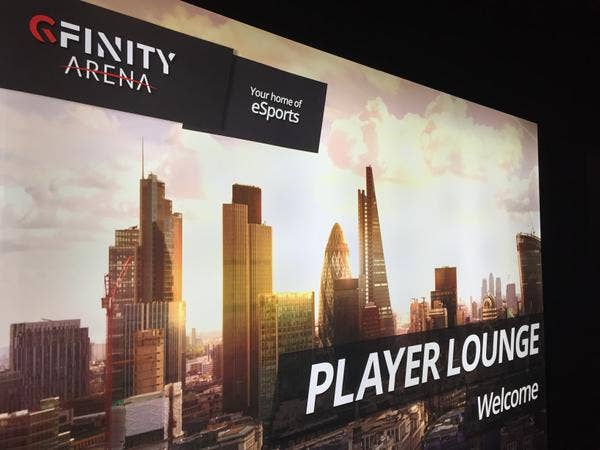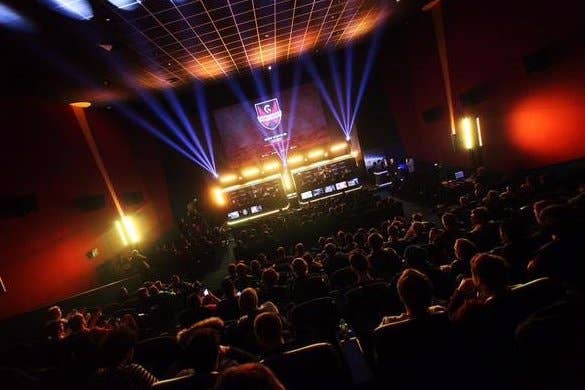Step into the Arena
Gfinity boss Neville Upton talks us through his plans for the UK's first dedicated eSports venue
Last weekend, the UK's very first dedicated eSports arena opened for business running a three-day long inaugural competition which saw EnVyUs take victory to become the second ranked eSports team in the world - and earn themselves a considerable paycheque in the process. Based in a semi-converted cinema in the small shopping centre attached to Fulham Broadway station in London, the Gfinity arena seats 600 fans in its two competition screens and a further 300 press in the dedicated press screening room and post-match interview area. Over the weekend, then venue was sold out, as teams from around the world competed to take the new venue's first prizes.
In the last six months, gfinity has expanded rapidly. Since floating on London's AIM stock exchange for £13.2 milllion, the company has employed ex-Nintendo UK boss David Yarnton and Robert Ohle, a long-standing CEO of world famous LAN event Dreamhack. It's also grown its registered userbase by an astonishing ten-fold, hitting a running total of 270,000 which rises by 30,000 every month. So far, the company looks to be cornering an incredibly fast-moving and lucrative gaming market in one of the world's major gaming economies. So why has is taken so long?
CEO Neville Upton was on hand to explain the acceleration of both the company and the phenomenon in general.
"It's a fantastic digital experience, the games are excellent, people have much better broadband, but it's also education: people just understand these games a lot more," he tells me as we bask in the glow of the gigantic main screen at the arena. "A lot of them are actually pretty complicated, but once you get you head around what's happening in, say, League of Legends, it's actually really fun to watch.
"Initially the sport was being driven by people who were participating, now it's being driven by people who don't participate but still enjoy watching - I think that's where a sport matures. There are tons of people who watch football or rugby but don't play - that's taken a while, but now that's happened I think we'll see those figures grow much faster."

He's not the only one. Research firm Newzoo expects the eSports market to worth $465 million within the next two years, with an audience equivalent to the NFL's. I ask Upton what sort of figures he's expecting to see for the events being broadcast from Fulham.
"It varies massively on the game, as well as what else is on," she says. "With FIFA you might get a few hundred thousand, something like CS:GO or CoD, you're going to get into the millions. Over the season we expect to get around 55 million views in total, which is pretty good compared to most mainstream sports. In fact, it dwarfs a lot of them - most sports apart form football. It's also truly global - it's watched across about 25 countries in our experience. They're massive figures."
Those massive audiences are, like many sports fans, incredibly engaged. They'll fanatically follow favourite teams or particular players, soaking up every last detail of their play in the hope of being able to emulate their skill. So why do they need to come to London to do that, when they've already got Twitch at home?
"I think again it's like any sport, you watch tennis or football on TV, but also live - they're very different experiences. You've got the energy of the crowd, the socialisation"
"I think again it's like any sport, you watch tennis or football on TV, but also live - they're very different experiences. You've got the energy of the crowd, the socialisation. Also just seeing it in the flesh, just how skilful these players are, and meeting them too - getting autographs, these are people's heroes, they're stars. I think it's a combination of those.
"Ironically, I think you actually see more of the detail when you're watching it on screen, but the advantage we've got here is that you're watching on screen too. A lot of people bring their tablets, so they can keep up with analysis. I think one of the reasons that eSports is so popular is that it's so engaging, socially, so people have that interaction online whilst at the arena."
In fact, gate receipts are a relatively small part of the business plan. By creating a space where they can hold events and own the broadcasting rights, Gfinity has tapped into a much bigger source of potential income.
"Just think of any other sport and that's our monetisation model," says Upton. "So, sponsorship, broadcasting rights, other media rights, advertising and things like ticket revenues. The rest adds up and it's all important, but I think the main ones are media rights and sponsorship."
As well as selling the footage to firms like Twitch, Gfinity's deal with Vue, the owners of the cinema chain they've set up in, also includes the potential to stream games to the company's other screens, spread all over Europe. If things go well, the plan is to do so regularly, creating fan events across several countries. It's equivalent, says Upton, to watching the football in the pub.
The partnership is also important because it shows just how much attention eSports is garnering from big name brands, entertainment and otherwise. Upton says it's something he sees more and more of - a fact he links to the tightly targeted demographic.
"If you're a brand that wants to get involved with 17-30 year old makes, then there aren't many better opportunities. 70 per cent of our audience is 17-30 year old males"
"I think that's somewhere we follow the US and it's getting bigger there. We're having some good conversations with people who are wanting to get involved. If you're a brand that wants to get involved with 17-30 year old makes, then there aren't many better opportunities. 70 per cent of our audience is 17-30 year old males. Premier league football and rugby are both less than ten per cent. In terms of real return on your investment, this is perfect. If you're a credit card company, a clothing label, food - very important! Even things like automotive. There's loads of sectors which I think are really keen to hit that demographic profile, I think this is a great opportunity for them and people are starting to wake up to that - certainly in the conversations we're having.
"Obviously, you've got all the industry providers as well, but I think it's really interesting when all these big brands who aren't directly related start coming in. Vue has been fantastic in terms of the pro-activity towards eSports - they see it as massive. They're a big global brand with hundreds of cinemas across the world and hopefully this is the start of something quite big where we can offer competitions in their other cinemas."

Whilst the sponsors are starting to pay attention, there's certainly competition for their cash, even within the market. Currently the UK is working off something of a deficit, with countries like the US and Korea dominating the international scene and several European nations also establishing large player and even bases. Upton sees the UK's trajectory ass promising, however.
"There's lots of talent from the UK already. What they're perhaps not so good at is having the confidence that they are that good. Secondly, the teams tend not to be as well organised as the US teams, for example. In the next few years, I'd love to see some of the UK teams and players becoming more prominent - we deserve to do a bit better than we do, I think.
"I think it's important that we stay agnostic and provide the best competitions. We don't have any bias, and I think starting to manage anyone wouldn't be right. What we can do is work with all the teams to make sure they get the right exposure, see that they get help with things like commercial rights. We're all in this together so we have to make sure that they all have a great experience. We can work with them to make sure they get the money they're due.
"I think we can help that. There are good managers out there, working hard on it, and I think money and sponsorship is a big thing. The US is ahead, Korea is obviously well ahead, but even some of the European teams are better organised. It will happen, there'll be a lot more money coming into the sport over the next few years."
"obviously of course we'll try and become profitable as soon as possible, but we don't want that to become the driver because then you start cutting corners"
The investment made by Upton's team and backers has been significant. The company's most recent financials revealed a £1.4 million loss over six months, but Upton is relaxed, happy that the investment and brand building spend is part of a strong, longterm plan.
"We've always said that we want to create something really big, very special, robust, he tells me. "The most important thing is that we really build up a strong reputation, and we're playing catch up. We need to move quickly and that's why we need a lot of cash, obviously of course we'll try and become profitable as soon as possible, but we don't want that to become the driver because then you start cutting corners.
"We believe, and I have the investor's backing, that as long as we create something where the community enjoys watching and the players love being part of it, the profit will come. If you really build it on those solid foundations then when the profit does come it's a very strong cashflow. If you try and get into profit too early, then often your longterm success suffers."









